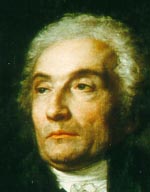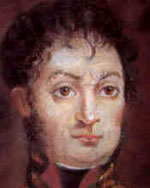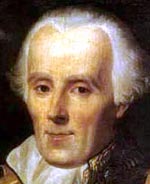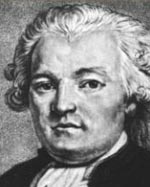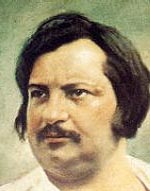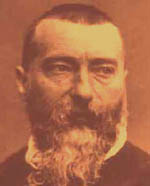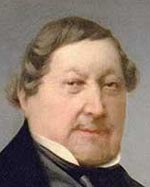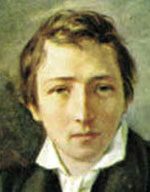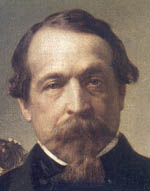Mots Français
Nineteenth CenturyJoseph de Maistre (1753-1821)
Nobody put the case for the inevitability of war more strongly than de Maistre, whose position was technically pro-monarchist and anti-Enlightenment, but whose philosophy was simply what Arthur Waley would have called Realist.Toute nation a le gouvernement qu'elle mérite (1811)
Every nation has the government it deservesHis chief summation of this viewpoint was in Les Soirées de Saint-Pétersbourg, published in the last year of his life. At one point he outdoes the Szma Fa in ferocity:
La guerre est donc divine en elle-même, puisque c'est une loi du monde (1821)
War is thus divine in itself, for it is a universal lawNapoléon Bonaparte (1769-1821)
If war was the new god, Napoléon was its prophet. He inaugurated the era of modern life, such as it is, based on the citizen army below and a new administrative superstructure above. Europe, not merely France, still reflects his constitutive labors. Napoléon had the practical soldier's appreciation of virtues which are in grain, and do not require preparation or advance warning. This phrase has passed into the language:[Courage] de deux heures après minuit
Two-o'clock-in-the-morning courageand this one pithily expresses the principle of unity of command:
Un mauvais général vaut mieux que deux bons.
One bad general is worth more than two good ones.A key element in the Napoleonic reforms, as in the parallel evolutions of the middle Warring States period, was a greater integration of the populace into the mechanisms of the state: its army, and its administration in general. This development let air into the stymied French social system. This often-quoted saying seems to put that development in a nutshell, and quite rightly, in a military nutshell:
Tout soldat français porte dans sa giberne le bâton de maréchal de France
Every French soldier carries in his knapsack the baton of a Marshal of Franceor, the same idea expressed retrospectively, from Napoléon's days in exile:
La carrière ouverte aux talents
Careers open to those with talentNapoléon's own career took a sudden downturn with his famous overreaching invasion of Russia. The following was said to the Polish ambassador after the 1812 French retreat from Moscow:
Du sublime au ridicule il n'y a qu'un pas
From the sublime to the ridiculous is no more than a step
Pierre-Jacques-Étienne Cambronne (1770-1842)
One of the talented people who rose rapidly in Napoléon's service was Cambronne, who had become a Brigadier General by the time of Waterloo. Called upon repeatedly by the clearly victorious English to surrender, he made the answerMerde!
Shit!Which unprintable word came to be called the Mot de Cambronne. Cambronne later (at a banquet in 1830, full of wine and of honors) denied the mot, and a more dignified version of his refusal is also in circulation. We decline to print it here.
Stendhal (Marie Henri Beyle, 1783-1842)
Born in Grenoble, to a lawyer father whom he hated, Stendhal went to Paris in 1799, accompanied Napoléon's Italian campaigns, and served with distinction in various administrative posts under Napoléon. He refused to serve the post-Napoléonic regime, and retired to Italy. His early pedantic work On Love (De l'Amour, 1922) is far surpassed literarily by his later autobiographical novels The Red and the Black (Le Rouge et le Noir, 1830) and The Charterhouse of Parma (La Chartreuse de Parme, 1839). Its final miscellaneous section begins thus:On peut tout acquérir dans la solitude, hormis du caractère. (#1)
One can acquire everything in solitude, except character.Pierre-Simon de Laplace (1749-1827)
In 1785, when Napoléon applied for admission to the Military School of Paris, one of his examiners was Laplace, then a Professor of Mathematics at the school. Laplace himself later brilliantly met Napoléon's standards, and became the scientific centerpiece of Napoléon's reign, the leader among the civilian counterparts to Napoléon's galaxy of military talent. From early in his career, Laplace concentrated all his efforts on working out the mechanics of the solar system from Newtonian principles. The resulting Mécanique Céleste (5v, 1799-1825) has a famously terse style, in which many a difficult mathematical demonstration is shrugged off with the following phrase:Il est aisé à voir
It is easy to seeIt is not by any means so easy to see, and in fact it is not always there to see; Hamilton as a young man gained a certain recognition by publishing a paper on one of Laplace's errors. The completed work was presented to Napoléon, who remarked "You have written this huge book on the system of the world without once mentioning the author of the universe." Laplace's reply took a certain amount of nerve:
Sire, je n'avais pas besoin de cette hypothèse
Sire, I had no need of that hypothesisAnthelme Brillat-Savarin (1755-1826)
Besides war and love, and on an almost equal footing, there are (in France) the pleasures of the table, whose classical treatise is Brillat-Savarin's Physiologie du Goût (1825). Among its maxims is this much-quoted and deterministic one:Dis-moi ce que tu manges, je te dirai ce que tu es
You tell me what you eat, and I'll tell you what you areVictor Hugo (1802-1885)
Hugo's father had been a general under Napoléon; he himself became the colossus of French letters in the 19th century. His poems, plays, and epic novels defined the Romantic movement. The new conventions of his play Hernani (1830) caused a riotous confrontation between classical and romantic partisans. His own attitude toward the classics was defined in the preface to his early work Odes et Ballades (1826):Admirons les grands maîtres, ne les imitons pas
Let is admire the great masters, but not imitate themAnother uproar occurred with the 1832 performance of his play
Le Roi s'Amuse
The King Amuses HimselfWhich depicted the frivolous love affairs of Francis I, while portraying as more noble the character of Francis's jester. The office of public censor had been abolished two years earlier, but the play was suppressed after its first performance by order of the Prime Minister, and Hugo entered into a vigorous public defense of artistic freedom. The ban was finally lifted 50 years later, and the revival of the play was superintended by its still living author. It is moments like these, moments sometimes of 50 years' duration, which have made Hugo a hero to the French public.
Honoré de Balzac (1799-1850)
Of peasant stock (the family name was originally Balssa), Balzac served two apprenticeships, one to the law, and a second to literature. In this he failed at first, but finally hit his stride in 1829, and from then to 1848 became the great chronicler of the human scene. His sense of the immediate was the source of his fecundity, but the reverse side of it was a gloom which was to darken the literary mind of the following century:La gloire est le soleil des morts (1834)
Fame is the sunshine of the deadA prodigious worker, he found (as did the also quite energetic Arnold Bennett, a century later) that random encounters were highly suggestive for his fiction:
Le hasard est le plus grand romancier du monde (1842)
Chance is the greatest storyteller in the worldAlexandre Dumas (1802-1870)
The romantic spirit of the nineteenth century was in part a reaction against the somewhat off-putting character of the modern age. Nobody caught this better or packaged it more successfully than Dumas the Elder, whose Three Musketeers trilogy was scorned by critics but devoured by publics, in France and around the world. Here is the thematic line which recurs throughout the first book of the trilogy, Les Trois Mousquetiers (1844):Tous pour un, un pour tous
All for one, and one for allA similar fascination with the swordsman's honor flourished at a similarly disturbing onset of modernism: the arrival of Imperial times in 03rd century China. Dumas also reduced to a single phrase a tradition of French misogyny going back to the Middle Ages. The phrase is from Les Mohicans de Paris (1854; stage version, 1864) and expresses the notion that there is a woman behind every complication:
Cherchez la femme
Find the womanAlphonse Karr (1808-1890)
In the newspaper age, the pamphlet has come to vie with the play as the place to insert quotable lines into the body cultural. In journalist Karr's monthly pamphlet Les Guêpes ("The Wasps") for January 1849 occurs this well-known and quintessentially world-weary line:Plus ça change, plus c'est la même chose
The more it changes, the more it stays the sameGioacchino Rossini (1792-1868)
This caustic epitome reflects, and for at least a moment rebuts, the artistic challenge of Wagner, which was felt and for the most part resisted in both France and Italy:Monsieur Wagner a de beaux moments, mais de mauvais quarts d'heure
Wagner has some lovely moments, but also some bad quarters of an hour
Eugène Delacroix (1798-1863)
In the French tradition, painters often assume a role as intellectuals, and the pronouncements of artists concerning literature are listened to with respect. Here is an insightful technical comment from Delacroix's Journal (5 February 1847):En littérature, le première impression est la plus forte
In literature, the first impression is the strongestOnly too true. The dynamics of reading the Analects, whose present form places some late interpolated material where it will first encounter the reader's eye, was explored, with compatible result, in The Original Analects (Appendix 5).
Heinrich Heine (1797-1856)
Outlawed in his native Germany for his radical political views, Heine lived in Paris from 1831 until his death in 1856. His life there scandalized even his admirers, such as the otherwise perceptively appreciative Matthew Arnold. Heine's wry last words were reported by the Goncourt brothers:Dieu me pardonnera. C'est son métier.
God will forgive me. It's his trade.Napoléon III (Louis Napoléon Bonaparte, 1808-1873)
His life reads like a comic opera (youthful exile, inept insurrections, botched banishments, prison escapes), but comes into focus after the Revolution of 1848, when he was elected President of the Second Republic. He then, by a military coup (1851), became Emperor (Second Empire, 1852-1870, with a liberal phase after policy failures in 1860). His advice on dealing with opponents shows a Dauist restraint that deserves to be remembered:En politique il faut guérir les maux, jamais les venger
In politics, one must fix problems, but never take revenge for themLouis Pasteur (1822-1895)
This fundamental maxim of scientific discovery was enunciated in an address delivered at the inauguration of the Faculty of Science of the University of Lille, on 7 December 1871. Luck is a factor in discovery, but one must be ready to recognize that opportunity when it does occur, and to take the next step:Le hasard ne favorise que les esprits préparés
Chance favors only the prepared mindAnd this rather brave remark, made in Pasteur's address at the inauguration of the Pasteur Institute (14 Nov 1888), might be taken as a symbolic rejoinder to Rossini. It stands against the recurring tendency to shrink European culture down to its national components, and set those components against each other:
La science n'a pas de patrie
Science has no countryCredit where credit is due: the same universality had earlier been claimed for art by Albert de Musset in his play Lorenzaccio (1843).
Gustaaf Schlegel (1840-1903)
In something of the scientific spirit, or at any rate as a boost for empiricism over predetermined theory, we in Sinology still recall this pioneer Dutch Sinologist's famous remark about how to acquire a knowledge of Chinese sentence structure:Lisez! Lisez! Jetez le grammaire!
Read! Read! Throw away your grammar book!This disdain may have been justified by the quality of grammar handbooks available at the time. But Chinese does have grammar, and there have been better accounts of it since, not excluding the one-page outline available in the Chinese Reference section of this site.
25 Dec 2005 / Contact The Project / Exit to French Index Page
